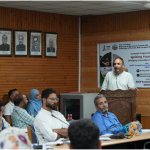For his immense knowledge in food technology, a senior Assistant Professor at Islamic University of Science and Technology (IUST) Awantipora, Dr Basharat Nabi Dar is representing India at Joint FAO, WHO Expert Meetings on Microbiological Risk Assessment (JEMRA) to recommend world policy document of food processing.
JEMRA is an international scientific expert group that is administered jointly by the Food and Agriculture Organization (FAO) of the United Nations and the World Health Organization (WHO) to provide scientific advice on microbiological hazards including expert advice on risk management options that are aimed at improving food safety.
JEMRA is tasked with the evaluation of different aspects of microbiological hazards in the food supply. “Across the world, there are only 18 members in JEMRA and I am representing India. I am from the food technology department and I look into the food processing section at JEMRA,” Dar told Rising Kashmir.
Hailing from Rohmoo village of south Kashmir’s Pulwama district, Dar did his MS and PhD in Food Technology. He started his professional career in 2012 as Assistant Professor of Food Technology at IUST, Awantipora.
Dar said, “We make world policy document of food safety and we give recommendations to WHO and FAO after which they forward it to Codex Alimentarius Commission (CAC).”
Later, the CAC on the recommendations and advice of JEMRA, would make a world policy document. The food safety document later becomes binding to all countries to implement the food safety laws of WHO and FAO.
Dar has joined JEMRA in July 2021. “The month I joined JEMRA, our group has released three documents for the whole world and they are all related to food safety for the world,” Dar said.
He said that nearly two Crore cases of food poisoning across the world remain unreported annually in the world and we are working to reduce it. “It is a big challenge for the UN.”
He said that the group also works for Sustainable Development Goals (SDG) regarding the food waste management and they want to reduce the food waste. “This is a hard zone in SDG and we are the only research group who is working on it.”
Dar has been a visiting scientist at the Institute of Food Science, Cornell University, USA under the CV Raman Fellowship of the University Grants Commission, India.
On asking about the researches, Dar said, “These studies involve the integration of the chemical and life sciences to understand the complexities of the food systems and provide solutions to challenges in their utilization as part of food security and safety which are part of Sustainable development goals (SDG30).”
Dar has edited 10 books and has more than 100 publications to his credit. He is also the recipient of the UGC research Award 2014-16 in the field of Agricultural sciences.
He is the Coordinator of the Food Testing Laboratory sponsored by the Ministry of Food Processing and Industries, India.
Dar is also a resource person to Jammu and Kashmir Horticultural Produce Marketing and Processing Corporation limited (JKHPMC) for establishment of Incubation centres under PMFME scheme.
He is also associated with several research projects. His research group works on the valorization of food waste, byproducts, underutilized and minor fruits and vegetables.
“Emphasis is placed on the identification and evaluation of interventions used throughout the world to reduce microbiological hazards on fresh fruits and vegetables that contribute to the risk of food-borne illnesses, taking into consideration their effectiveness, practicality, and suitability,” he said.








